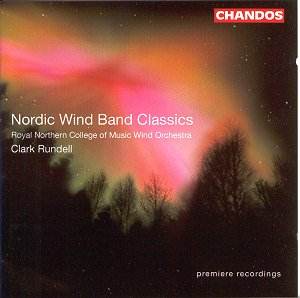Despite its title, Nordic Wind Band Classics,
this disc features several premiere recordings of works that will be
unfamiliar to many. That said, there is much to interest both enthusiasts
of Scandinavian music generally and those with an interest in the growing
repertoire for wind band. This is a repertoire that is expanding largely
thanks to figures such as Timothy Reynish and Clark Rundell at the Royal
Northern College of Music. Both men have been strongly involved in building
interest in the medium and persuading a good number of younger composers
to write works for symphonic wind band in the process.
Geirr Tveitt is a name that has become considerably
more familiar to record buyers since Naxos began to champion his work
a couple of years ago. Born and resident in the Hardanger region of
Norway for his entire life, much of his output and lifetime collection
of folksongs was tragically lost in a fire that destroyed his rural
home in 1970, an event that understandably devastated the composer.
Whilst certainly not oblivious to stylistic developments in the wider
musical world (an hour or so spent with the Naxos recordings of his
piano concertos will testify to this) much of his music reflects nostalgia
for a way of Norwegian life that was fast disappearing during his latter
years. Both of the pieces recorded here, the brief yet haunting Old
Mill on the Brook and the more substantial Sinfonietta di soffiatori,
are predominantly lyrical, gentle and folk-tinged, often touching in
their innocent manner. Only in the third movement of the Sinfonietta,
Fanfara funebra, do storm clouds gather towards the close, albeit
quickly dispelled in the music of ‘Mountain Joy’ that follows.
Einojuhani Rautavaara and Ole Schmidt are
exact contemporaries although their Finnish and Danish roots respectively
have sent them in rather different directions creatively. Rautavaara’s
A Soldier’s Mass was written to commemorate the fiftieth
anniversary of the Finnish army and reflects the personal experiences
of the composer in the army, both during peacetime and as a teenager
during the Second World War. Although bearing individual titles (The
Lord of Battles, Have Mercy on Us, On the Field of Glory and
At Death’s Door) the four movements each also carry references
to their place in the mass itself. The final movement, In hora mortis,
is particularly affecting, Rautavaara in mystical mode and not far away
from Cantus Arcticus (minus the birds) that was to follow four
years later. The Schmidt on the other hand is a highly witty, very much
tongue-in-cheek three-movement suite that uncannily captures the dedicatee’s
sound world. Musical quotes abound, not all of which are necessarily
cribbed from Stravinsky himself, often tossed around and juxtaposed
to hilarious effect (Ravel’s Bolero gets a notable ribbing in
the second movement) and as such the piece occupies very different musical
territory to any of its bedfellows.
Conceived in typically symphonic style, Aulis Sallinen’s
Chorali is a largely sombre memorial to his parents, a deeply
felt processional that organically unfolds over its nine and a half
minute span and which melodically, is not always far away from his slightly
older compatriot Rautavaara. Nielsen’s brief Paraphrase on
Nearer My God to Thee is something of an oddity, written for a memorial
service following the sinking of the Titanic in which many Danes lost
their lives (the orchestra were said to play the hymn as the ship went
down) Nielsen was to later react against what he then considered to
be its strong programmatic nature. In point of fact it is not without
interest (listen for the wonderful modulation and entry of the tuba
at 0:30) and is heard here in a realisation by Wayne D. Gorder. The
only Swedish representation on the disc falls to Hugo Alfvén.
His spirited Festival Overture is conventional enough in its
formal conception but is perhaps most notable for its characteristically
rich vein of melody and imaginative scoring.
Clark Rundell and his Royal Northern winds give polished
performances of pieces that are worth getting to know. Whether they
are "classics" of the genre is open to opinion but this is,
nonetheless, a highly worthwhile disc that will give considerable enjoyment.
Christopher Thomas

